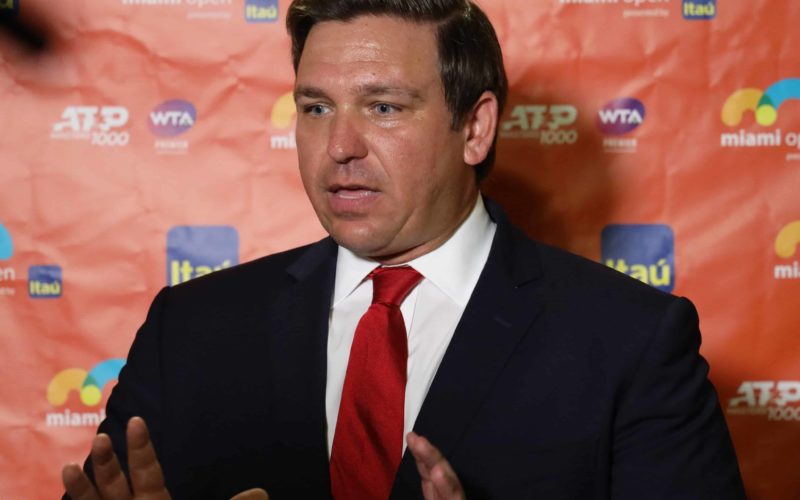Government
Pressure Builds on Florida Gov. DeSantis to Toss Out Dosage Limits

Florida Commissioner Nikki Fried is calling on Gov. DeSantis and the health department to roll back dosage restrictions in a recent emergency rule.
Patients and advocates in Florida are fed up with restrictions to access for medical cannabis. Florida health officials enacted new emergency rules on August 29, imposing explicit limits on the amount of medical cannabis that patients may legally obtain and consume.
Advocates like NORML are concerned, saying that the emergency rules were established behind closed doors—absent of any public input. Further, the rules arrived almost six years after voters initially approved Florida’s constitutional amendment establishing a medical cannabis system.
On September 8, Florida Commissioner of Agriculture and Consumer Services Nikki Fried blasted the Florida Department of Health (DOH) and its Office of Medical Marijuana Use (OMMU), calling on them to roll back “extreme” dosage restrictions enacted through an emergency rule, a process that afforded less than three days advance notice to doctors and patients and provided no public comment opportunity.
Florida Department of Health’s OMMU website, Emergency Rule 64ER22-8 stipulates that a qualified physician may not issue a certification for more than three 70-day supply limits of cannabis or more than six 35-day supply limits of cannabis in smoking form. Also, a 35-day supply limit for cannabis in smoking form shall not exceed 2.5 ounces. Many more restrictions were added to the list.
The rules do allow physicians, however, to request exceptions to the limits for certain patients.
Commissioner Fried announced this letter at a press conference held September 8 at the Florida Capitol where she was joined by medical cannabis patients and advocates, including Dr. Barry Gordon with the Compassionate Cannabis Clinic and Jodi James with the Florida Cannabis Action Network (FLCAN) to discuss why the emergency rules must be tossed out and how it can do harm to medical cannabis patients, such as ones who require higher doses of THC.
“This rule change is unnecessary, its implementation poorly noticed, and its impacts extremely harmful with hundreds of thousands of patients in Florida no longer able to access their medicine in the quantities they need for efficient treatment as determined by their doctors. This reflects a lack of understanding of medical cannabis by DOH and OMMU at best and is an act of cruelty at worst,” said Commissioner Fried. “We are sending a strong message to the DeSantis Administration to put patients first, protect their access to legal and lifesaving medicine, and roll back these restrictions. I will never stop fighting for our medical cannabis patients and full legalization.”
Watch the video of the press conference here.
Commissioner Fried sent a public letter to Florida’s Surgeon General, who oversees DOH’s OMMU, and the letter may be downloaded here.
NORML’s Deputy Director Paul Armentano described the newly imposed limits as a “solution in search of a problem.” He said: “These arbitrary and unnecessary limits were established without input from either the patient community or from those physicians who specialize in providing oversight to medical cannabis patients. They will likely result in creating unnecessary confusion and they will place an undue burden upon patients and their doctors. Decisions regarding cannabis care ought to be between patients and their physicians; they should not be made by bureaucrats.”
Fried is an independently-elected member of the Florida Cabinet.
Florida Gov. Ron DeSantis told a group of reporters on August 23 that medical cannabis license holders in the state need to pay more for their license application and renewal fees. State officials “should charge these people more,” DeSantis said.
Source: https://hightimes.com/news/pressure-builds-on-florida-gov-desantis-to-toss-out-dosage-limits/
Business
New Mexico cannabis operator fined, loses license for alleged BioTrack fraud

New Mexico regulators fined a cannabis operator nearly $300,000 and revoked its license after the company allegedly created fake reports in the state’s traceability software.
The New Mexico Cannabis Control Division (CCD) accused marijuana manufacturer and retailer Golden Roots of 11 violations, according to Albuquerque Business First.
Golden Roots operates the The Cannabis Revolution Dispensary.
The majority of the violations are related to the Albuquerque company’s improper use of BioTrack, which has been New Mexico’s track-and-trace vendor since 2015.
The CCD alleges Golden Roots reported marijuana production only two months after it had received its vertically integrated license, according to Albuquerque Business First.
Because cannabis takes longer than two months to be cultivated, the CCD was suspicious of the report.
After inspecting the company’s premises, the CCD alleged Golden Roots reported cultivation, transportation and sales in BioTrack but wasn’t able to provide officers who inspected the site evidence that the operator was cultivating cannabis.
In April, the CCD revoked Golden Roots’ license and issued a $10,000 fine, according to the news outlet.
The company requested a hearing, which the regulator scheduled for Sept. 1.
At the hearing, the CCD testified that the company’s dried-cannabis weights in BioTrack were suspicious because they didn’t seem to accurately reflect how much weight marijuana loses as it dries.
Company employees also poorly accounted for why they were making adjustments in the system of up to 24 pounds of cannabis, making comments such as “bad” or “mistake” in the software, Albuquerque Business First reported.
Golden Roots was fined $298,972.05 – the amount regulators allege the company made selling products that weren’t properly accounted for in BioTrack.
The CCD has been cracking down on cannabis operators accused of selling products procured from out-of-state or not grown legally:
- Regulators alleged in August that Albuquerque dispensary Sawmill Sweet Leaf sold out-of-state products and didn’t have a license for extraction.
- Paradise Exotics Distro lost its license in July after regulators alleged the company sold products made in California.
Golden Roots was the first alleged rulebreaker in New Mexico to be asked to pay a large fine.
Source: https://mjbizdaily.com/new-mexico-cannabis-operator-fined-loses-license-for-alleged-biotrack-fraud/
Business
Marijuana companies suing US attorney general in federal prohibition challenge

Four marijuana companies, including a multistate operator, have filed a lawsuit against U.S. Attorney General Merrick Garland in which they allege the federal MJ prohibition under the Controlled Substances Act is no longer constitutional.
According to the complaint, filed Thursday in U.S. District Court in Massachusetts, retailer Canna Provisions, Treevit delivery service CEO Gyasi Sellers, cultivator Wiseacre Farm and MSO Verano Holdings Corp. are all harmed by “the federal government’s unconstitutional ban on cultivating, manufacturing, distributing, or possessing intrastate marijuana.”
Verano is headquartered in Chicago but has operations in Massachusetts; the other three operators are based in Massachusetts.
The lawsuit seeks a ruling that the “Controlled Substances Act is unconstitutional as applied to the intrastate cultivation, manufacture, possession, and distribution of marijuana pursuant to state law.”
The companies want the case to go before the U.S. Supreme Court.
They hired prominent law firm Boies Schiller Flexner to represent them.
The New York-based firm’s principal is David Boies, whose former clients include Microsoft, former presidential candidate Al Gore and Elizabeth Holmes’ disgraced startup Theranos.
Similar challenges to the federal Controlled Substances Act (CSA) have failed.
One such challenge led to a landmark Supreme Court decision in 2005.
In Gonzalez vs. Raich, the highest court in the United States ruled in a 6-3 decision that the commerce clause of the U.S. Constitution gave Congress the power to outlaw marijuana federally, even though state laws allow the cultivation and sale of cannabis.
In the 18 years since that ruling, 23 states and the District of Columbia have legalized adult-use marijuana and the federal government has allowed a multibillion-dollar cannabis industry to thrive.
Since both Congress and the U.S. Department of Justice, currently headed by Garland, have declined to intervene in state-licensed marijuana markets, the key facts that led to the Supreme Court’s 2005 ruling “no longer apply,” Boies said in a statement Thursday.
“The Supreme Court has since made clear that the federal government lacks the authority to regulate purely intrastate commerce,” Boies said.
“Moreover, the facts on which those precedents are based are no longer true.”
Verano President Darren Weiss said in a statement the company is “prepared to bring this case all the way to the Supreme Court in order to align federal law with how Congress has acted for years.”
While the Biden administration’s push to reschedule marijuana would help solve marijuana operators’ federal tax woes, neither rescheduling nor modest Congressional reforms such as the SAFER Banking Act “solve the fundamental issue,” Weiss added.
“The application of the CSA to lawful state-run cannabis business is an unconstitutional overreach on state sovereignty that has led to decades of harm, failed businesses, lost jobs, and unsafe working conditions.”
Business
Alabama to make another attempt Dec. 1 to award medical cannabis licenses

Alabama regulators are targeting Dec. 1 to award the first batch of medical cannabis business licenses after the agency’s first two attempts were scrapped because of scoring errors and litigation.
The first licenses will be awarded to individual cultivators, delivery providers, processors, dispensaries and state testing labs, according to the Alabama Medical Cannabis Commission (AMCC).
Then, on Dec. 12, the AMCC will award licenses for vertically integrated operations, a designation set primarily for multistate operators.
Licenses are expected to be handed out 28 days after they have been awarded, so MMJ production could begin in early January, according to the Alabama Daily News.
That means MMJ products could be available for patients around early March, an AMCC spokesperson told the media outlet.
Regulators initially awarded 21 business licenses in June, only to void them after applicants alleged inconsistencies with how the applications were scored.
Then, in August, the state awarded 24 different licenses – 19 went to June recipients – only to reverse themselves again and scratch those licenses after spurned applicants filed lawsuits.
A state judge dismissed a lawsuit filed by Chicago-based MSO Verano Holdings Corp., but another lawsuit is pending.
Source: https://mjbizdaily.com/alabama-plans-to-award-medical-cannabis-licenses-dec-1/
-

 Business2 years ago
Business2 years agoPot Odor Does Not Justify Probable Cause for Vehicle Searches, Minnesota Court Affirms
-

 Business2 years ago
Business2 years agoNew Mexico cannabis operator fined, loses license for alleged BioTrack fraud
-

 Business2 years ago
Business2 years agoAlabama to make another attempt Dec. 1 to award medical cannabis licenses
-

 Business2 years ago
Business2 years agoWashington State Pays Out $9.4 Million in Refunds Relating to Drug Convictions
-

 Business2 years ago
Business2 years agoMarijuana companies suing US attorney general in federal prohibition challenge
-

 Business2 years ago
Business2 years agoLegal Marijuana Handed A Nothing Burger From NY State
-

 Business2 years ago
Business2 years agoCan Cannabis Help Seasonal Depression
-

 Blogs2 years ago
Blogs2 years agoCannabis Art Is Flourishing On Etsy













